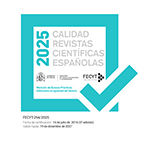La revisión de la épica artúrica medieval en la literatura germano-oriental
Resumen
Este estudio trata acerca de la recepción productiva y reelaboración de la materia artúrica medieval en el teatro de la extinta RDA. En Die Ritter der Tafelrunde, el dramaturgo germano- oriental Christoph Hein lleva a escena la decadencia y posterior desaparición de los ideales caballerescos en el ocaso de la Edad Media. La obra se estrenó en abril de 1989, meses antes de la caída del muro que daría paso al final definitivo de la RDA. El hecho de que el motivo central de la pieza fuera la desaparición de un sistema social y político obsoleto facilitó la interpretación de la corte artúrica como trasunto del gobierno de Erich Honecker. Pero más allá de las interpretaciones ad hoc, interesa estudiar esta pieza dramática dentro de una tendencia constante a lo largo de la historia de aquel país: la adopción del legado literario, representado en este caso por la novela de Wolfram von Eschenbach, Parzival, y su instrumentalización con fines extraliterarios.
Descargas
Descarga artículo
Licencia
La Revista de Filología Alemana, para fomentar el intercambio global del conocimiento, facilita el acceso sin restricciones a sus contenidos desde el momento de su publicación en la presente edición electrónica, y por eso es una revista de acceso abierto. Los originales publicados en esta revista son propiedad de la Universidad Complutense de Madrid y es obligatorio citar su procedencia en cualquier reproducción total o parcial. Todos los contenidos se distribuyen bajo una licencia de uso y distribución Creative Commons Reconocimiento 4.0 (CC BY 4.0). Esta circunstancia ha de hacerse constar expresamente de esta forma cuando sea necesario. Puede consultar la versión informativa y el texto legal de la licencia.










